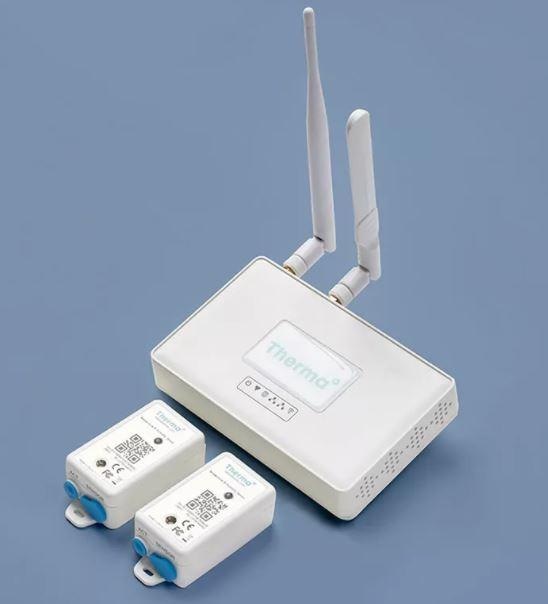AZoSensors speaks with the CEO of Therma, Manik Suri. Therma is a technology startup that builds hardware and software tools that help to protect the planet. The flagship product, Therma°, is an automated temperature and humidity monitoring platform that uses IOT sensors to better protect and manage refrigeration assets.
What inspired the development of Therma?
Therma° was originally conceptualized as an addition to our first product, CoInspect. At the time, we had deployed CoInspect's mobile workflow tools across thousands of restaurant locations to ensure food safety and quality better. In the summer of 2019, we had an epiphany that emerged from talking to our customers and watching them use the CoInspect app: a critical customer need was real-time temperature monitoring of their refrigerated products.
The result was Therma°, an automated temperature and humidity monitoring platform that uses IOT sensors to better protect and manage refrigeration assets. Initially devised to be a component of CoInspect's product suite, Therma° evolved into our flagship product and, more recently, led to a company rebrand.
How do the Therma temperature sensors help to reduce food waste?
Therma° prevents food spoilage in two ways:
- Alerts via email, SMS, and phone call notify restaurants when their refrigeration is out of set temperature thresholds.
- Therma° Data Insights identify when equipment requires maintenance, preventing costly last-minute repairs and food inventory waste, while extending equipment asset life.
What industries can benefit from the use of Therma sensors?
Today, Therma is primarily deployed across the food and hospitality industries. Our partners include leading restaurant chains, food manufacturers, and logistics operators worldwide, including McDonald's, Burger King, Taco Bell, Domino's Pizza, 7-Eleven, NOW Foods, and Wyndham Hotels.
How do Therma sensors help to maintain optimal storage conditions?
Therma° sensors alert staff members when refrigeration temperatures are outside of approved ranges. Alerts are tied to specific equipment items such as walk-in fridges, display cases and "low-boy" undercounter refrigeration units, so operators can quickly identify whether a specific piece of equipment is malfunctioning or the entire location may be experiencing power issues.
After receiving alerts, operators mobilize to take the appropriate action, including closing doors left open during restock, calling maintenance repair or relocating inventory to alternate locations.
How does Therma alert customers when temperatures exceed the set parameters?
Our customers can elect to receive alerts via SMS, email or phone call. And these alerts can be configured on a per sensor, per equipment item basis, tailored to the perishable products they store.
How can the data provided by Therma be used to assess if maintenance is required?
Measuring temperature and humidity data continuously over long periods allows us to understand equipment performance and identify trends and outliers -- such as the door of a low-boy undercounter refrigerator having a loose latch and "leaking" cooling. Viewing trends over extended periods can indicate the need for equipment maintenance. For example, a slow, slight warming trend in a refrigeration unit could signify a broken compressor.

The system employs a long-range, low-power radio signal (LoRaWAN), can you give us more information about this?
LoRaWAN stands for long-range, low-power wide-area network technology. We choose to utilize LoRaWAN for Therma because it's more reliable at carrying signal through dense insulated walls and materials, than alternatives like WiFi and BlueTooth. WiFi and BlueTooth have been around for a while, but they offer notoriously poor signals in industrial environments with a lot of barriers -- including the back of house of your typical restaurant. Moreover, when monitoring refrigeration assets, the thick metal-plated walls used in such equipment further inhibit signal transmission. With LoRaWAN, restaurant operators consistently have access to temperature data from anywhere in the connected world.
Therma's LoRaWAN enabled sensors work at an unparalleled range of 1,200+ feet, operate without Bluetooth or WiFi, offer military-grade network security, and have an easy drop-in-place installation. These benefits combined with a low-cost, no-hardware purchase pricing model, have enabled Therma° to rapidly deploy smart cold chain sensors in restaurants, hotels and other businesses skeptical of earlier versions of this technology in the past.
What's next for Therma?
As a team, we have a unique opportunity in front of us. Our product has the potential to help address the most significant challenge humanity faces: climate change.
Therma° is building a smart cold chain monitoring platform that reduces major drivers of global warming -- food waste, energy inefficiency and refrigerant emissions -- across the food and pharmaceutical supply chains. We're steadily making progress toward this vision. Our latest environmental impact report revealed that Therma° could reduce emissions by 3.4 billion metric tons of CO2 by 2050, which is the equivalent of planting 3.4 billion trees.
By helping protect our food, our health, and our planet, Therma° has the potential to have a profound social impact in the years ahead.
Where can readers find more information?
More information can be found on our website.
About Manik Suri
Manik is the Founder and CEO of Therma (www.hellotherma.com), a technology startup whose mission is to help protect our food and our planet. Therma builds safety and sustainability tools to eliminate food waste, improve energy efficiency and reduce refrigerant emissions — protecting consumers and combating climate change. Therma is deployed across thousands of restaurants, retailers, manufacturers, and government agencies worldwide, with leading brands including McDonalds, Starbucks, Burger King, NOW Foods, 7-Eleven and Wyndham Hotels.
Previously, Manik co-founded the Governance Lab (GovLab), an innovation center at NYU that develops technology solutions to improve government. He is a former Affiliate of Harvard's Berkman Center for Internet & Society and has held positions at global investment firm D. E. Shaw & Company and the White House National Economic Council.
Disclaimer: The views expressed here are those of the interviewee and do not necessarily represent the views of AZoM.com Limited (T/A) AZoNetwork, the owner and operator of this website. This disclaimer forms part of the Terms and Conditions of use of this website.